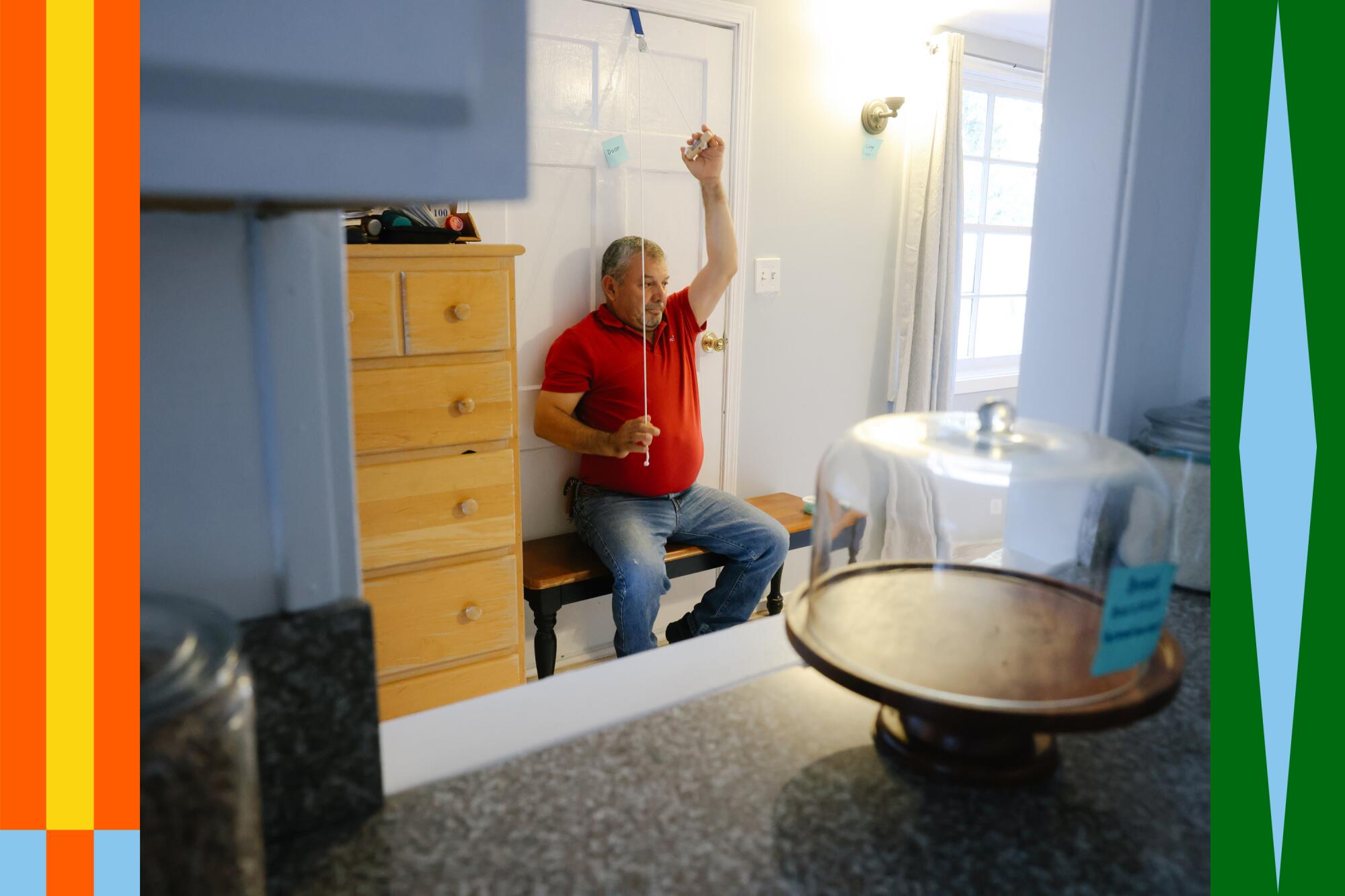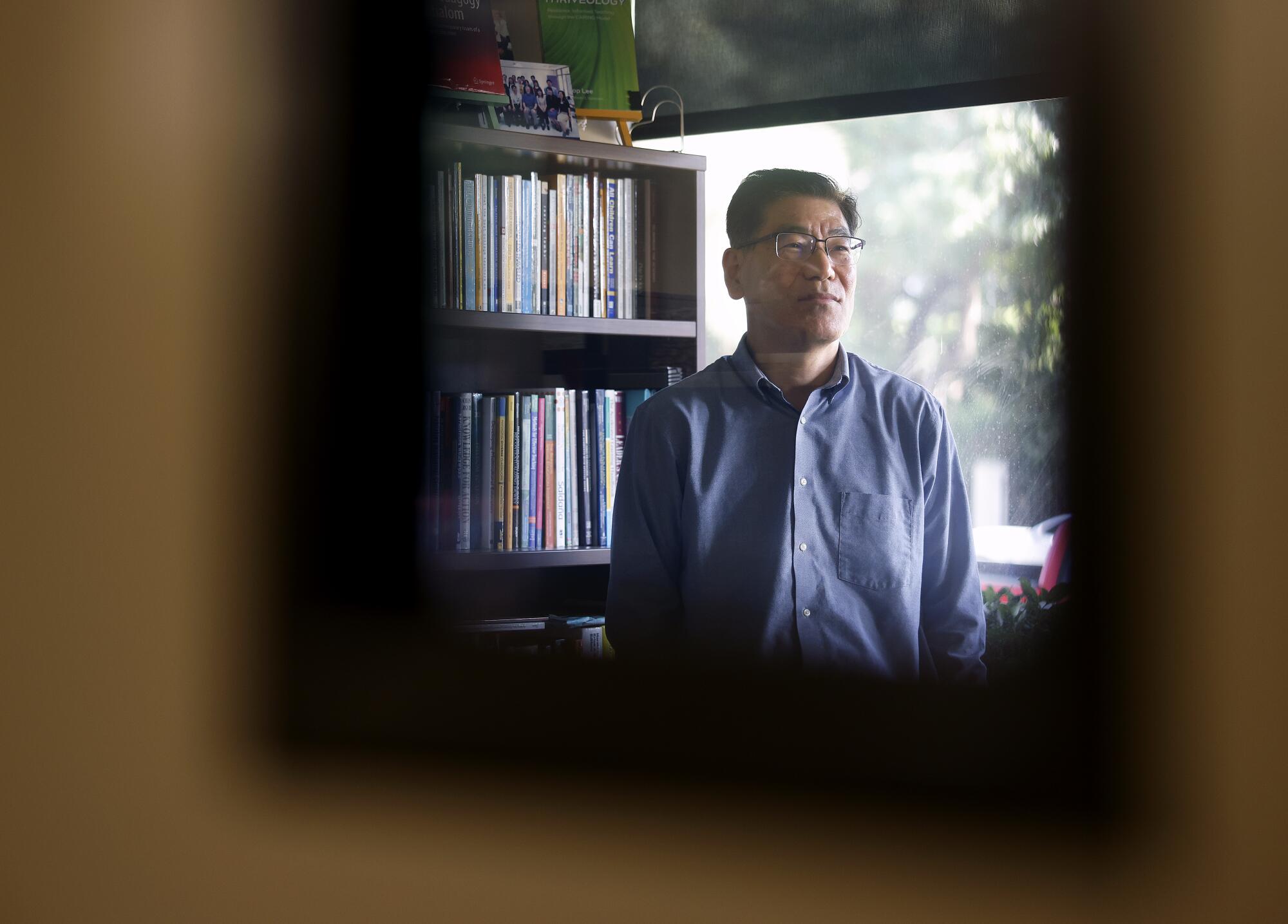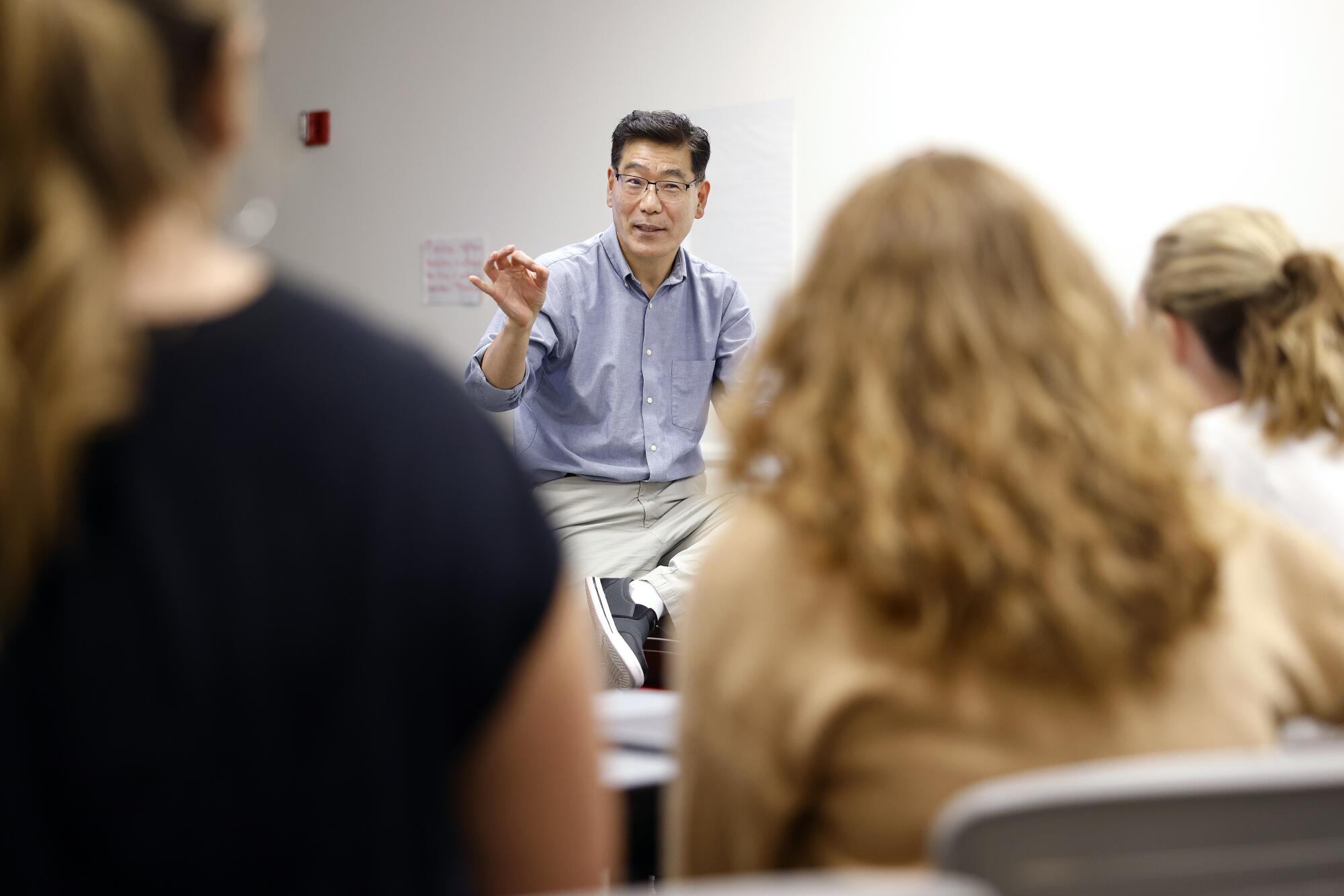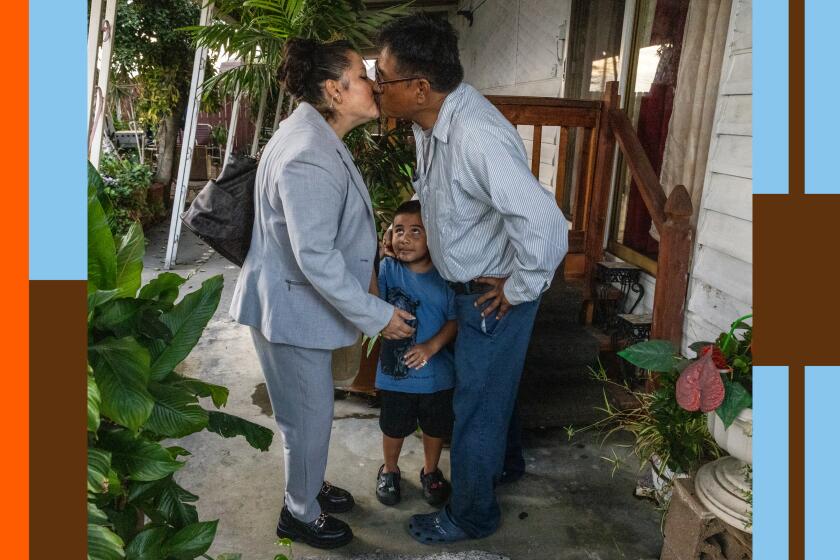
- Share via
A few days after arriving in Los Angeles, Joaquin Hurtado walked into a cafe in Studio City, asked for a manager, then recited one of the few phrases he’d memorized in English: “I’m looking for a job.”
If he would work for $2.60 an hour — then 30 cents below the minimum wage — the manager said, they could use a busboy.
That was 1979, and the then-17-year-old, who grew up on a ranch in central Mexico, had landed his first job in the U.S. It was followed, in years to come, by stints at other restaurants, a supermarket and a fiberglass factory, and as a day laborer.
Often working alongside other immigrants, Hurtado quickly noticed a through-line: It wasn’t uncommon, he said, for bosses to yell at them, short them on pay, schedule them for undesirable shifts or stiff them on raises.
“You just take it and take it,” Hurtado said. “It’s the way it is. They know they can do what they want.”
Hurtado’s employment situation improved drastically after President Reagan’s 1986 amnesty granted him legal status in the country and thus a pathway to a stable, union career as a garbage truck driver for the last three decades.
But his early work experiences are emblematic of the scope and frequency of on-the-job discrimination that immigrants to the U.S. continue to face.
The widespread nature of employment discrimination was a key finding of an unprecedented, nationwide poll of more than 3,000 immigrants conducted earlier this year by The Times in partnership with KFF, the nonprofit formerly known as the Kaiser Family Foundation.
Of the working immigrants surveyed, nearly half — 47% — reported being paid less than U.S.-born workers to do the same job, not being paid for all their hours worked, being given fewer opportunities for promotions or raises, getting worse shifts or having less control over their hours, or being harassed or threatened in the workplace because they were immigrants.
Many said they had experienced multiple forms of discrimination. Among those whom the survey identified as likely to be undocumented — immigrants who reported that they were not citizens and did not have a valid green card or visa — two-thirds reported workplace mistreatment. So did 55% of those who said they didn’t speak English well, according to the poll, which surveyed immigrants with a wide range of careers and statuses under U.S. law.
“There’s a lot of racism,” said an immigrant in Texas who has worked in produce warehouses and who participated in one of several focus groups conducted alongside the survey. “Because we were undocumented, we worked more and earned less.”

In interviews, several immigrants who participated in the poll, including Hurtado, described contentment with aspects of the lives they’d built, but also nostalgia and sometimes exhaustion. Others spoke of a sense of gratitude tempered by the feeling that, at least in the workplace, they often weren’t seen or rewarded for their full potential.
Immigrants to the U.S. face extensive challenges, but they still report high levels of optimism about their futures and trust in American institutions, a comprehensive survey has found.
For several years, that’s how HeeKap Lee felt.
After emigrating from South Korea in his early 30s, he earned a doctorate in education at Indiana University Bloomington and eventually moved to rural Kentucky for an associate professorship at a small Christian university.

“I was the first nonwhite faculty since the school started,” Lee said, sighing as he recounted the way people stared at him on campus and around town. “I always felt like an outsider.”
He once found several dead birds tossed into his front yard; another time, Lee said, he walked outside to find his mailbox smashed. He tried to convince himself it was an accident, but, if so, wouldn’t someone have left a note?
He prayed, asking God to send him somewhere else, and eventually moved to a small university in Ohio. Although it was better, Lee said, he twice was passed over for a promotion from associate professor to full professor. He had plenty of research experience, he said, and remembers thinking it didn’t feel fair.
“I didn’t lack anything,” he said.
Carrying out the KFF/L.A. Times survey of immigrants required work far beyond the normal survey, but the result provides a unique source of information about America’s immigrant population.
His situation improved drastically in 2009, when he moved to Southern California for a job at Azusa Pacific University, where he still works as a professor.
“In L.A.,” he said, “I’m part of all the diversity.”
Lee, 58, who co-wrote a book titled “Multiculturalism,” said he feels proud of the work he’s doing now, knowing that, as an immigrant, his perspective helps shape his students who go on to become teachers themselves, working with students from all different cultures.

“The power of this country,” he said, “is to embrace diversity as our driving force.”

Although Lee and Hurtado have spent decades in the U.S., a third immigrant, who participated in a focus group in L.A. as part of the Los Angeles Times/KFF research, arrived seven years ago, fleeing death threats in her native Honduras.
Now 20, Sharon, who requested her surname be withheld for privacy, grew up in a coffee-growing region on the western edge of the country. As a girl, she plucked mangoes from trees when food ran scarce, sliced them and sold them to students at her school.
When she was 13, her father received word that members of a rival gang planned to kill him but intended to target his daughters first to make him suffer. Almost immediately, Sharon and her younger sister, then 8, boarded a bus headed north.

They eventually arrived in Texas, she said, and spent several weeks in migrant detention facilities with other unaccompanied minors, receiving English lessons where the adults insisted on being addressed as “Teacher.”
The habit stuck and, once reunited with her mother in L.A., she forced herself to participate in her seventh-grade classes despite knowing very little English. While other students addressed teachers as either “Mr.” or “Miss,” she started her questions the way she had learned in Texas.
Other students taunted her, nicknaming her “Teacher Girl.” Already discouraged, she soon got a call saying her father was missing, and then a text from a relative in Honduras with a picture of a lifeless body in a red sack tossed in a dry creek bed. Only his legs were showing, but Sharon immediately recognized his jeans.
She screamed so much that she fainted and, for months felt despondent, skipping school to sleep or wander the city. Deeply apathetic, she began pulling out of her blinding depression only after learning that she was pregnant.
“My daughter saved me,” she said. “She became my motivation.”
Sharon began looking for work but knew it would be hard without legal work documents or English skills. The owner of a 99 cents store where she sometimes shopped in South L.A. needed a cashier for 11-hour shifts Monday through Friday.
The pay was $400 a week.
That was far below minimum wage, Sharon knew, but it felt like her only option. The owner hadn’t asked for work documents and told her she could bring her baby with her during her shifts. She worked there for several months but quit after the store was robbed at gunpoint while she was eight months pregnant with her second daughter.

In the years since, she has pieced together work, packaging orders at a corner store, delivering for UberEats, disinfecting an office building during the pandemic and cleaning the drink-crusted floors of a nightclub near Koreatown.
She also worked Friday and Saturday nights cleaning the bar and serving drinks at the club, although she was limited to delivering beverages without alcohol because she wasn’t yet 21. Almost every shift, she said, a customer propositioned her.
“You’re an immigrant, right?” she recalled one man saying. “Don’t you want to make more money?”
“When you’re done here,” another man said, “I’ll give you $500 to meet me.”
“No, sorry,” she told them. “I don’t do that.”
She felt exhausted and guilty that, in her rare downtime, she had little energy to play with her daughters. At a temporary office cleaning gig, she had a backpack vacuum strapped to her small frame for eight hours, and it got so hot it often left a red mark on her back.
She was often given more work than she could finish during her allotted hours, she said, and although she stayed to finish she was never paid for the extra hours. When she explained the situation to a boss and mentioned she might contact a workers’ rights group, she stopped getting scheduled for shifts.
“They’ve never taken me seriously at my jobs,” she said. “They think I’m just a little doll. They don’t know what I’m capable of.”
Her situation improved somewhat in 2021, when she got paperwork allowing her to work legally in the U.S. But she still has two big hurdles. She needs something with enough flexibility that, if her daughters’ daycare calls, she can pick them up within an hour, and she needs to improve her English.

After inquiring about work at a McDonald’s in the Pico-Union neighborhood, she was told she needed to know a bit more English — a reality, she said, that makes her feel defeated, questioning whether she could’ve tried harder to learn the language when she arrived.
“Maybe it’s my own fault?” she says, pausing before growing more definitive. “It is my fault.”
Then she pauses again, reflecting on how young and deeply depressed she was at the time, and her voice cracks.
“But I was just a girl.”

Growing up in the Mexican state of Zacatecas, Hurtado lived miles from the nearest secondary school.
There was no bus and it was too far to walk, so as a teenager, he moved to his grandfather’s ranch and spent his days helping him herd cattle and gather firewood. At 17, he did what many teenagers in his family and town had done: He headed to the U.S.
After arriving in Los Angeles on July 4, 1979, he quickly landed the busboy job in Studio City, but it lasted only a week. When a customer asked for a glass of water in English, he didn’t understand and, making a guess and hoping for the best, took them a cup of coffee. The manager told him he could come back if he learned more English.
Next came a dishwashing gig at a spot called Pizzeria Numero 1, where he worked his way up to food prep and then chef. By the early 1980s, not long after getting married and learning his wife was pregnant, he had a job waxing the floors at a Hughes supermarket in the San Fernando Valley.
During one of his shifts, he asked a co-worker to cover for him while he took his lunch break, Hurtado recalled, and during that time a customer shattered a jar of mayonnaise on the floor and someone slipped on it. The person made a complaint, Hurtado said, and his boss insisted that, since it had happened during his shift, it was his fault and that he was being fired.
He explained to his boss that he’d asked for coverage, Hurtado said, but he could tell his boss had made up his mind. It was an injustice, Hurtado said, but one he couldn’t dwell on long because he needed to focus on finding a job before his baby was born. He eventually found work at a fiberglass factory in Sylmar, earning around $3 an hour.
“I can’t live like this,” he recalled thinking. “I need a higher salary.”
He started taking English classes at night and, after the 1986 amnesty, became one of the roughly 3 million undocumented immigrants, many in California, granted legal status. He finally had some bargaining power.
“How much will you pay me?” he’d ask potential employers. “That’s not enough, I’m not interested.”

Around that time, a friend who worked as a garbage truck driver offered to help train him for the same role. After six months of studying, he got his license and found a job making $16 an hour. For years, he hadn’t saved much of anything and now, in a single year, he amassed $38,000, enough for a down payment on a four-bedroom home in Sylmar.
“A beautiful house,” he said proudly. “My own house.”
The doom and gloom that many Americans offer up on social media and in politics betrays something fundamental about this country. These days, it’s immigrants who keep hope alive.
A devotee to the world of Mexican rodeo known as charrería, Hurtado, who said nothing melts away his stress like riding a horse in the open air, soon saved enough to buy a sprawling property in Acton, as well as a horse and trailer.
Eventually, he separated from his wife, and she kept the home in Sylmar. For a while, he lived with his elderly parents in their mobile home nearby and went on to marry Yadira Pasillas Alamillo, an elementary school teacher he knew from back in Zacatecas.
Earlier this summer, she and her two youngest daughters, Monica Espinoza Pasillas, 12, and Deicy Espinoza Pasillas, 18, who Hurtado considers his own, left Mexico and moved in with him in a two-bedroom home he’s renting in North Hills.
The family planted pink flowers and a small olive tree outside, and inside, Hurtado’s wife has tacked up blue Post-it notes to remind her and the girls of the English words and pronunciations — “wall (gual),” one reads. Monica recently enrolled in seventh grade, and Deicy and their mother are taking an immersive English course three hours a day, five days a week.
On a recent afternoon, all three lounged on the couch, updating one another on what they’d learned recently.
Deicy, who hopes to become a plastic surgeon, said that, with the help of a TikTok video, she could finally hear the difference between “tree” and “three.”

Her mother, who plans to return to teaching or pursue a nursing degree once she’s learned more English, said she’d learned the phrase “the big cheese,” which frustratingly, she noted, didn’t translate to anything related to cheese but rather to el pez gordo (the fat fish).
Monica, who teared up as she spoke about her friends back in Mexico, said that some students from her new school from Guatemala and Colombia had helped her when she couldn’t understand their teacher.
Her mother wrapped her in a tight hug, and Hurtado handed her a blue handkerchief, saying he knew that feeling of nostalgia, but was proud of her for the progress she’d made in just a few weeks.
“You’re getting into a rhythm,” he told her. And it was something he was eager to do himself.
Off work to recover from a shoulder surgery in August, the 61-year-old now fills his days with physical therapy appointments and twice-a-day, at-home mobility exercises.

Hurtado, who now makes $32 an hour and hopes to retire in about three years, said he still enjoys his shifts at the wheel of his truck, especially the interactions with customers. When he’s working, he wakes around 4 a.m., picks up his truck and then a treat from a corner store — a juice or ice cream — and traces a route that often winds through Alhambra, Pasadena and La Cañada Flintridge.
“I like what I’m doing,” he said. “I love my job.”
Here’s how the Los Angeles Times/KFF poll of American immigrants was conducted.
More to Read
Sign up for Essential California
The most important California stories and recommendations in your inbox every morning.
You may occasionally receive promotional content from the Los Angeles Times.

















